

What is Self-Confidence: Understanding Competence & Self-Assurance. “Once we believe in ourselves, we can risk curiosity, wonder, spontaneous delight, or any experience that reveals the human spirit.”– E.E.
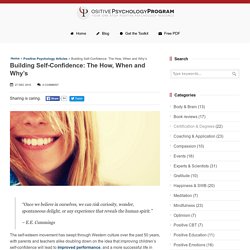
Cummings The self-esteem movement has swept through Western culture over the past 50 years, with parents and teachers alike doubling down on the idea that improving children’s self-confidence will lead to improved performance, and a more successful life in general (Baskin, 2011). After all, the most successful people tend to have the highest confidence in themselves, right? This movement started with a book published in 1969, in which psychologist Nathaniel Branden argued that most mental or emotional problems people faced could be traced back to low self-esteem.
Branden laid the foundation for the Self-Esteem Movement with his assertion that improving an individual’s self-esteem could not only result in better performance but could even cure pathology. Defining the Difference: Self-Efficacy, Self-Confidence, and Self-Esteem What is Self-Efficacy? How to Cultivate Self-Trust: Advice from Rising Strong by Brené Brown. A couple of weeks ago, Brené Brown published her latest book, Rising Strong.
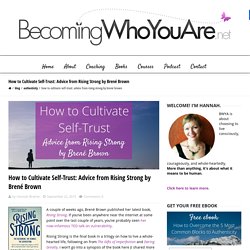
If you’ve been anywhere near the internet at some point over the last couple of years, you’ve probably seen her now-infamous TED talk on vulnerability. Rising Strong is the final book in a trilogy on how to live a whole-hearted life, following on from The Gifts of Imperfection and Daring Greatly. I won’t go into a synopsis of the book here (I shared more details in my Amazon review) but I highly recommend clearing your diary for this weekend to read all three titles. One of the topics Brené covers in Rising Strong, and the topic I want to share with you today, is trust. First of all, what is trust? Be Confident & at Ease. How often do you talk yourself out of something before you’ve even tried?
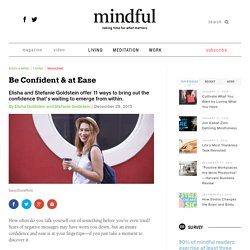
Years of negative messages may have worn you down, but an innate confidence and ease is at your fingertips—if you just take a moment to discover it. 1. Start your day out right The way we start our day makes a big difference in how we feel the rest of the day. Take a moment to pause, check in with how you’re feeling, relax your body, think about what you’re grateful for, and bring a sense of presence to your morning routine. 2. Science shows that how we hold our bodies directly impacts our confidence. 3.
Make a list of the people who nourish and encourage you. 4. One of the best motivators to continue a behavior is when we feel like we are “good” at something. 5. We each carry around deep-seated fears about ourselves, from “I’m not good enough,” and “I’m not worthy” to “When will they see that I’m a phony.” 6. We often make big goals without thinking through what’s actually achievable. 7. 8. Self-Doubt. Self Esteem vs Self Compassion. Psychological Safety. Trust. Grit. Know-How. How to Build Self-Confidence and Self-Belief (Definition + Quotes) 7 Steps to Gain More Confidence Now.
Whenever I speak with leaders about their greatest struggles, the answer I hear more than any other is a lack of confidence.
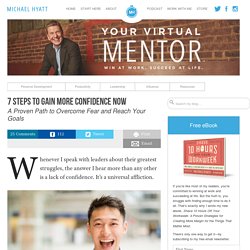
It’s a universal affliction. Early in my career, I suffered from almost crippling social anxiety. At formal office functions, I’d sweat like crazy and my hands would go ice-cold. Later, as the CEO of Thomas Nelson, I wrestled with heavy feelings of inadequacy. Was I really up for the job? It turns out that most leaders deal with insufficient confidence. Ever dreamed of launching your own self-hosted WordPress blog? How do they stay in the game and keep winning? And you can too. I’d like to unpack these seven steps below. Clarity. How to Believe in Yourself. By Leo Babauta There was a long time when the lack of belief in myself was a major factor in my life.
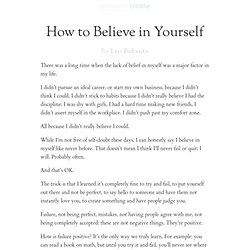
I didn’t pursue an ideal career, or start my own business, because I didn’t think I could. I didn’t stick to habits because I didn’t really believe I had the discipline. I was shy with girls, I had a hard time making new friends, I didn’t assert myself in the workplace.
Metacognition.